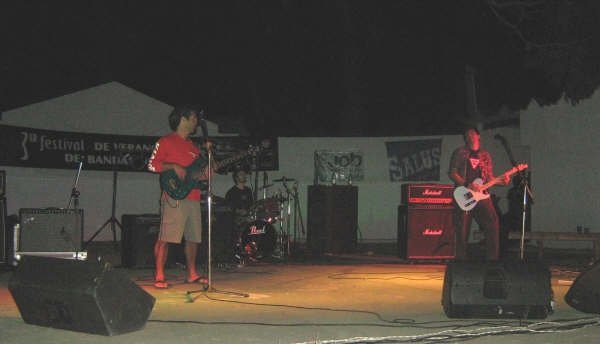“Mal Yo” [My Fault] is a Uruguayan trio that plays good ol’ rock & roll. It comprises guitarist/lead singer Diego Da Silva, bassist Martín Bernasconi and drummer Sergio Alastra. Sergio is actually slightly older than the rest, and (to my ear) he is the standout musician in the band. Yes, I have some catching up with the doctor to do.
Seriously, now, he provides the most memorable passages in their songs – look at the way in which he sustains the tension during the choruses to “La 22”, or the killer triplet that he uses to wrap up “A Tiempo” after having shifted beats all through the song. Besides, any person who has had the nerve to play in a band named “El Tatú Lunar” [The Lunar Tattoo] and then in another that was named “Monos Con Navajas” [Monkeys With Blades] has earned my absolute admiration. He must get invited to fewer parties than me.
The band is currently recording its debut album, and a couple of their songs can be downloaded for free on their website. (They can also be streamed on their MySpace page). These are “A Tiempo” [In Time], “Tu Lugar” [Your Place] and “La 22” [Table Number 22]. I have to admit that I am not really bowled over by their music on the whole, but one of these three songs has got me interested like little else. I must have listened to the song “A Tiempo” more than the three guys combined with all of their families and friends. Cubed. I honestly don’t recall having done something like that before, and that was the reason I decided to write about them. Because I don’t really like the other two songs they have, as I find the main riffs just a tad too generic – the main riff in “La 22”, for example, reminds me too much of songs like “Tu Dei” by Dsus4 (another Uruguayan band, and one that is sadly playing the great gig in the sky after having released a reasonably good debut album in 2006 entitled “Nada Permanece Quieto” [Nothing Remains Still]).

Mal Yo Playing Live: Martín Bernasconi, Sergio Alastra & Diego Da Silva
“A Tiempo” is the one song of theirs that sounds fresh and invigorating, and the lyrics display a very realized use of alliterative figures. Each verse is topped and tailed with the expressions “A veces” [Sometimes] and “A tiempo” [In Time], and the chorus is quite impacting, especially the second time around. The song also has a distinctive structure, as it comprises only two verses and a chorus that is played once and then repeated after the solo before the song concludes. That shifts the thematic emphasis of the lyrics, which being topped and tailed as described above would be imbued with a sort of conciliatory (or at least conclusive) air. This turns the song into something that ends up expressing losses that one would have thought were to be averted: “Y nosotros dos añoramos/nuestra vida perfecta” [And the two of us long for/our perfect life]. Continue reading

